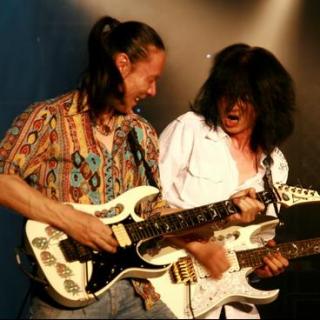
介绍:
As a man who is about to hit his 50s, Zhao Mingyi maybe will never rock like he did 24 years ago when he joined Black Panther.
"Black Panther had far more than five members at the very beginning. We often rehearsed together. Rock music opened a window for us."
Drummer Zhao Mingyi is a founder member who helped the rock band survive all the ups and downs since its creation in 1987.
"I was in charge of the band's daily operations, even like booking air tickets and hotels, renting trucks, and setting up instruments - these were all my jobs. And of course, I was the drummer. I like that. Now I am almost 50. I joined the band in 1990. We have been through a lot but I don't want to forget even a single story. I really enjoyed all these years in the band."
Born in northeast China's Heilongjiang Province, Zhao started to learn to play percussion at an early age. After graduating from one of the most prestige art institutions in this country - the People's Liberation Army Arts Academy, he, like most other young music students at that time, found a job in the military band of the PLA. And then he met some pioneers of China's rock music at work and his life course took a shift afterwards.
"At that time the rock music circle in China was very close. People always came to see each other's live concerts. So it was like you could see almost everyone in the circle at every concert. This kind of frequent communication nurtured the whole industry, and of course, nurtured so many great bands and great works."
At almost the same time, China's first hard rock band Tang Dynasty came under the spotlight. Their self-titled first album in 1992 rocked the music world all over China.
Chief guitarist Chen Lei says the rise of rock music at the beginning of 1990s was closely related to the economic and social background in China at that time.
"In fact it was related to the economy and what society needed. Like in my hometown Tangshan, there were some 200 music bars that needed more than 200 guitarists, drummers and so on. There was not so many demographic divisions and even some primary school students could spout some of our lyrics."
Chen Lei says most of the top rock musicians had fulltime jobs at that time, so they spent their nights playing music.
"Ding Wu told me that he bought his guitar by earning money making kites. He earned five cents for each kite and a guitar could cost hundreds of Yuan - so you can imagine what it was like."
By the early 1990s, with the rise of legendary rock bands, including Black Panther, Tang Dynasty as well as the Asian powerhouse Beyond, Chinese rock music came to its heyday.
However, its fall was equally astonishing. In the middle and late 1990s, the whole social and economic conditions for rock music in China changed a lot. Besides, after the flying solo of Panther's chief vocalist Dou Wei, the sudden death of Beyond's nucleus Wong Ka Kui in a stage accident and the death of Tang Dynasty's bass player Zhang Ju in a car accident, meant that all three leading rock bands hit hard times and it took them at least a decade to regroup.
Today, some of the rock veterans like Black Panther's Zhao Mingyi is still trying to revitalize China's rock music and good news for them is the market environment is much better now.
Others chose other career paths, including Tang Dynasty's guitarist Chen Lei who is now teaching guitar.
"I teamed up with classic music master Wang Zhen and keyboard veteran Gao Jun in a school teaching students instruments from the first grade until they graduate from the high school. We believe the students are able to get a comprehensive music education this way."
"For me, music is a career for life. It is my job, my career and also something in my veins. I spent a lot time on many other things that I don't care. But music is different - I truly enjoy it."
That was Zhao Mingyi looking back on his whole life in music. It is safe to say that with such musicians, China's dream of rock music will never die.
For Studio+, I'm Zhang Wan.
大家还在听

